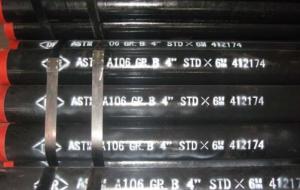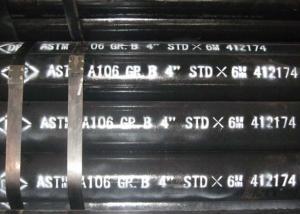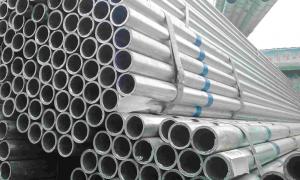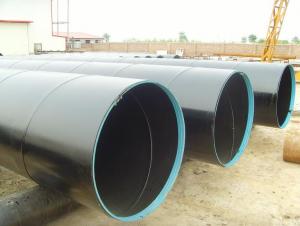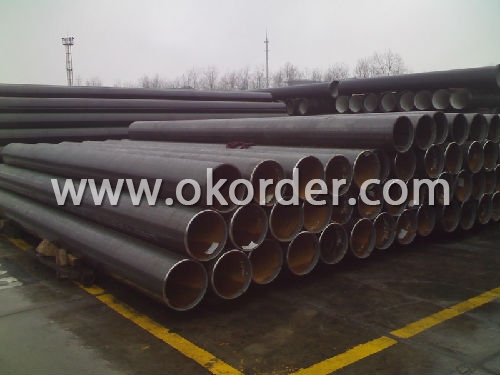API 5L Seamless line Pipe J55
- Loading Port:
- China Main Port
- Payment Terms:
- TT or LC
- Min Order Qty:
- 50MT m.t.
- Supply Capability:
- 5000 Tons Per Month m.t./month
OKorder Service Pledge
OKorder Financial Service
You Might Also Like
| |||||||||||||||||||||||||||||||||||||||||||||||||||||||||||||||||||||||||||||||||||||||||||||||||||||
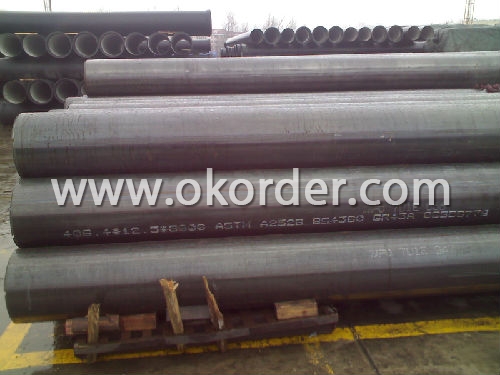 |
- Q:What are the advantages of using pre-fabricated steel pipes?
- There are several advantages of using pre-fabricated steel pipes in various applications. Firstly, pre-fabricated steel pipes offer a high level of durability and strength. Steel is known for its robustness and resistance to external forces, making it an ideal material for constructing pipes that need to withstand high pressure or heavy loads. This durability ensures that pre-fabricated steel pipes have a longer lifespan compared to other materials, reducing the need for frequent replacements and maintenance. Secondly, pre-fabricated steel pipes provide excellent corrosion resistance. Steel pipes are often coated with protective layers, such as galvanization or epoxy, which prevent rusting and corrosion. This corrosion resistance is particularly crucial when the pipes are used in industries or environments where they may come into contact with moisture, chemicals, or other corrosive substances. By utilizing pre-fabricated steel pipes, the risk of leaks, deterioration, or failure due to corrosion is significantly reduced. Another advantage of pre-fabricated steel pipes is their versatility and ease of installation. These pipes are manufactured to precise specifications before being delivered to the site, allowing for quick and efficient installation. Their modular nature means that they can be easily assembled, disassembled, and reconfigured as needed, making them suitable for a wide range of applications, from industrial settings to residential construction. Moreover, pre-fabricated steel pipes can be easily integrated with other building components, such as fittings, valves, and connectors, ensuring a seamless connection and reducing installation time and costs. Furthermore, pre-fabricated steel pipes are more environmentally friendly compared to other materials. Steel is a highly recyclable material, and using pre-fabricated pipes reduces the consumption of natural resources and energy required for their production. Additionally, the long lifespan of steel pipes reduces waste generation and the need for frequent replacements, further contributing to sustainability efforts. Lastly, pre-fabricated steel pipes offer cost advantages. While the initial cost of steel pipes may be higher than some other materials, their durability and low maintenance requirements result in long-term cost savings. The reduced need for repairs, replacements, and maintenance, as well as the ease of installation, translates into lower overall project costs and reduced downtime. In summary, the advantages of using pre-fabricated steel pipes include durability, corrosion resistance, versatility, ease of installation, environmental friendliness, and cost-effectiveness. These benefits make pre-fabricated steel pipes a preferred choice for various industries and applications.
- Q:How are steel pipes used in the petrochemical industry?
- Steel pipes are extensively used in the petrochemical industry for various applications such as transporting oil, gas, and other fluids. These pipes are highly durable and can withstand high pressure and extreme temperatures, making them ideal for the harsh conditions in petrochemical plants. Additionally, steel pipes are resistant to corrosion, ensuring the safe and efficient transportation of chemicals. They are also used for structural support and as conduits for electrical wiring in petrochemical facilities. Overall, steel pipes play a crucial role in the petrochemical industry by enabling the safe and reliable transportation of fluids and providing structural integrity.
- Q:What is the maximum length of a steel pipe?
- The maximum length of a steel pipe can vary depending on various factors such as the manufacturing process, transportation constraints, and practical limitations. However, steel pipes can typically be manufactured and transported in lengths ranging from a few meters to several hundred meters.
- Q:What is a steel pipe?
- A steel pipe is a cylindrical hollow tube made of steel, known for its strength and durability. It is commonly used in various industries for transporting fluids, gases, and solids, as well as for structural purposes in construction and infrastructure projects.
- Q:How are steel pipes used in agriculture?
- Steel pipes are commonly used in agriculture for a variety of purposes, such as irrigation systems, water supply lines, and drainage systems. These pipes are durable, resistant to rust and corrosion, and can withstand high pressure, making them ideal for transporting water and other fluids across farmland. Additionally, steel pipes are used to construct structures like greenhouses, fencing, and livestock enclosures, providing strength and stability to support agricultural operations.
- Q:How are steel pipes used in the construction of irrigation systems?
- Steel pipes are commonly used in the construction of irrigation systems due to their durability and strength. They are used to transport water from the source to the fields or crops efficiently. Steel pipes can withstand high pressure and are resistant to corrosion, making them ideal for long-term use in irrigation systems. Additionally, their smooth interior surface allows for a smooth flow of water, ensuring efficient water distribution and minimizing the risk of clogs or blockages.
- Q:Can steel pipes be used for water supply systems?
- Yes, steel pipes can be used for water supply systems. Steel pipes are commonly used in water supply systems due to their durability, strength, and resistance to corrosion. However, it is important to ensure that the steel pipes are properly coated or lined to prevent any potential leaching of metals into the water supply. Additionally, regular maintenance and inspection is necessary to prevent any damage or deterioration that could affect the overall integrity of the water supply system.
- Q:What is the difference between hot-dip galvanizing and electroplating for steel pipes?
- Hot-dip galvanizing and electroplating are both methods used to protect steel pipes from corrosion, but they differ in the process and the properties of the resulting coating. Hot-dip galvanizing involves immersing the steel pipe in a bath of molten zinc, which forms a thick and durable coating that bonds metallurgically with the steel. This provides excellent corrosion resistance and protection even in harsh environments. On the other hand, electroplating involves the deposition of a thin layer of zinc onto the steel pipe using an electric current. While electroplating also offers corrosion protection, the coating is typically thinner and less durable than hot-dip galvanizing. Hot-dip galvanizing is typically preferred for steel pipes that require long-lasting protection, while electroplating may be suitable for applications where a thinner coating is sufficient.
- Q:How are steel pipes insulated for thermal applications?
- Steel pipes are commonly insulated for thermal applications using various materials such as fiberglass, mineral wool, or foam insulation. These insulating materials are typically wrapped around the steel pipes to create a protective barrier that reduces heat transfer. Additionally, a vapor barrier may be installed to prevent moisture condensation. This insulation helps to maintain the desired temperature of the fluid or gas being transported through the pipes and prevents energy loss.
- Q:What is the meaning of "DN" and "Phi" in the dimensioning of steel pipe diameter and how to apply the mark?
- DN is a kind of Engineering path, not the actual value, due to the different standards, so the actual corresponding values is not the same; phi is refers to the actual value, the same national standard pipe inside the steel pipe, the actual value is the same, for example, GB/T8163 and GB GB fluid pipe spiral pipe and GBT/T9711.1 GB/T12459 the same nominal diameter corresponding to the actual value is the same as the actual value; and American Standard steel standard ANSI B 16.38 and ANSI B 16.9 standard American Standard fitting the same nominal correspondence is the same. If marked, the nominal diameter should be added DN, and the actual value can be omitted.
1. Manufacturer Overview |
|
|---|---|
| Location | Hebei, China |
| Year Established | 1990 |
| Annual Output Value | Above 30 milionrmb |
| Main Markets | Germany; Japan;Korea; America; Brasil; Canada |
| Company Certifications | ISO9001:2000 ; API |
2. Manufacturer Certificates |
|
|---|---|
| a) Certification Name | |
| Range | |
| Reference | |
| Validity Period | |
3. Manufacturer Capability |
|
|---|---|
| a)Trade Capacity | |
| Nearest Port | Tianjin; Qingdao |
| Export Percentage | 50% |
| No.of Employees in Trade Department | Above 10 |
| Language Spoken: | English; Chinese |
| b)Factory Information | |
| Factory Size: | 8,5000square meters |
| No. of Production Lines | Above 10 |
| Contract Manufacturing | OEM Service Offered; Design Service Offered |
| Product Price Range | High Average |
Send your message to us
API 5L Seamless line Pipe J55
- Loading Port:
- China Main Port
- Payment Terms:
- TT or LC
- Min Order Qty:
- 50MT m.t.
- Supply Capability:
- 5000 Tons Per Month m.t./month
OKorder Service Pledge
OKorder Financial Service
Similar products
New products
Hot products
Hot Searches
Related keywords

